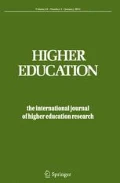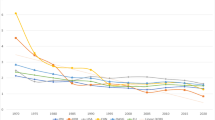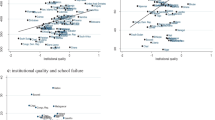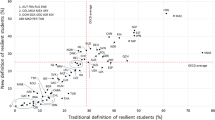Abstract
New public governance emphasises less state, more market and more hierarchy as the cornerstones for effective steering of higher education institutions. Based on an explorative analysis of qualitative and quantitative data of fourteen German and European economics departments, we investigate the steering effects of six new public management instruments in the years 2001 and 2002 on subsequent placement success of PhD graduates. Using crisp set Qualitative Comparative Analysis to analyse the data, our results deliver strong support for the positive effects of competition for resources and the varying effects of hierarchy on PhD education. Governance of successful departments is characterised by two solutions: transparency over academic achievements as one single success factor in each solution or a combination of additional funding based on national competitive performance with either no public policy regulations for departments or no university regulations for departments. Governance of unsuccessful departments is characterised by one solution: university regulations for departments or a combination of no additional funding based on national competitive performance and no transparency over academic achievements. Our results strengthen the strong impact of selected competitive mechanisms as an effective governance instrument and the partially detrimental effects of state regulations. University regulations turn out to be successful if they increase transparency over academic achievements by faculty members. Success is unlikely if those rules intervene into PhD education.
Similar content being viewed by others
Notes
He later extended the framework to ‘hierarchy’ as a fourth dimension (Clark 1998).
We do not analyse the dimensions “stakeholder guidance” and “academic self-governance” because, in contrast to findings by Henkel (2000) and Leisyte (2007), nobody in our sample of interviewees indicated any external stakeholder or any reduction of academic self-governance, thus leaving us with no variance in these two dimensions.
A majority of German states, for example, established a regime of quasi-competitive elements where they first forced university departments to cut their basic resources with the perspective to establish a kind of research foundation which will redistribute these savings according to a prospective reward system (Leszczensky and Orr 2004).
Accreditation in the English Research Assessment Exercise took place in 2001 and 2008, for example.
According to Combes and Linnemers (2003) weighted ranking of publications, the economics department in Toulouse (France), which would operate under a suboptimal governance regime, is ranked 1st and the London School of Economics (Great Britain), operating in a governance regime very close to “perfect” NPM criteria, is ranked 2nd for publications in Europe.
In order not to confuse the basic assumptions of statistical methods with csQCA, we use the term “condition” instead of “independent variable”.
Amir and Knauff (2008) point out the high correlation between placement success of PhD graduates and the academic level of the departments they graduated from.
The figures match calculations of post-doc positions in several countries in the EU. In France and The Netherlands, around 29% of all PhD graduates obtain a job in academia. In Great Britain, about 27% of all PhD graduates pursue a job in universities (STRATA-ETAN 2002, pp. 84–86). In Germany, only little data exists regarding post-doc positions. But, as Enders and Bornmann (2001) have shown, around 29% of PhD graduates in biology and mathematics find a job in academia.
Several statements were not made in English, which made the authors translate them in order to come as closely as possible to the original statements.
We calculate the unique coverage scores with overlapping cases, but it is also possible to come to the same conclusion by subtracting the percentage of the raw coverage score of the opposite configuration from the total coverage, 100% (e.g. 100–57% = 43%). The latter procedure only works for two configurations.
According to Ragin (2006), a coverage score of 0.326 is “substantial”, at least for fuzzy sets.
References
Aghion, P., Dewatripont, M., Hoxby, C. M., Mas-Colell, A., & Sapir, A. (2009). The governance and performance of research universities: Evidence from Europe and the U.S. NBER Working Paper 14851. http://www.nber.org/papers/w14851. Accessed May 2009.
Amir, R., & Knauff, M. (2008). Ranking economics departments worldwide on the basis of PhD placement. Review of Economics and Statistics, 90(1), 185–190.
Backes-Gellner, U. (1992). Berufsethos und akademische Bürokratie–Zur Effizienz alternativer Motivations- und Kontrollmechanismen im Vergleich deutscher und US-amerikanischer Hochschulen. Zeitschrift für Personalforschung, 6(4), 403–435.
Backes-Gellner, U. (2001). Indikatorenorientierte Mittelvergabe in der Universität: Chancen und Risiken. In I. Ebsen & R. Ewert (Eds.), Das Neue Steuerungsmodell und die Universitätsreform (pp. 61–78). Frankfurt am Main: Ein Tagungsband.
Bartelse, J. (1999). Concentrating the minds. Utrecht: Uitgeverij Lemma.
Berghoff, S., Federkeil, G., Giebisch, P., Hachmeister, C.-D., & Müller-Böling, D. (2002). Das Forschungsranking deutscher Universitäten. Centrum für Hochschulentwicklung, Arbeitspapier 40. http://www.che.de/downloads/AP40.pdf. Accessed July 2009.
Berning, E., & Falk, S. (2004). Promotionsstudien: ein Beitrag zur Eliteförderung. Beiträge zur Hochschulforschung, 3, 54–77.
BMBF. (2005). Bund-Länder-Vereinbarung gemäß Artikel 91 b des Grundgesetzes (Forschungsförderung) über die Exzellenzinitiative des Bundes und der Länder zur Förderung von Wissenschaft und Forschung an deutschen Hochschulen. Bundesministerium für Bildung und Forschung. http://www.bmbf.de/pub/pm19_2005-anlage-vereinbarung.pdf. Accessed Aug 2008.
Bowen, W. G., & Rudenstine, N. L. (1992). In pursuit of the Ph.D. Princeton: Princeton University Press.
Braun, D., & Merrien, F.-X. (1999). Governance of universities and modernization of the state: Analytical aspects. In D. Braun & F.-X. Merrien (Eds.), Towards a new model of governance for universities? A comparative view (pp. 9–33). London and Philadelphia: Jessica Kingsley.
Breneman, D. W. (1976). The Ph.D. production process. In J. T. Froomkin, D. T. Jamison, & R. Radner (Eds.), Education as an industry (pp. 1–52). Cambridge: Ballinger.
Burris, V. (2004). The academic caste system: Prestige hierarchies in PhD exchange networks. American Sociological Review, 69, 239–264.
Clark, B. R. (1983). The higher education system. Academic organizations in cross-national perspective. Berkeley CA: University of California Press.
Clark, B. R. (1998). Creating entrepreneurial universities: Organizational pathways of transformation. Oxford: Pergamon Press.
Colander, D. (2008). The making of a global european economist. Kyklos, 1(2), 215–236.
Combes, P.-P., & Linnemer, L. (2003). Where are the economists who publish? Publication concentration and rankings in Europe based on cumulative publications. Journal of the European Economic Association, 1(6), 1250–1308.
Coupé, T. (2003). Revealed performances: Worldwide ranking of economists and economics departments, 1990–2000. Journal of the European Economic Association, 1(6), 1309–1345.
Cronqvist, L. (2007). TOSMANA. Tool for small-N analysis. http://www.tosmana.net/. Accessed 1 June 2008.
Dahan, A. (2007). Institutional change and professional practices: The case of the French doctoral studies. In Paper presented at AOM Academy of Management, 8. Philadelphia (USA).
Dahan, A., & Mangematin, V. (2007). Institutional change and professional practices: The case of the French doctoral education. In Paper presented at the Première conférence internationale du RESUP “Les Universités et leurs marchés” in Paris, Feb, 1st–3rd 2007.
Davis, G. (2003). A contract state? New public management in Australia. In P. Koch & P. Conrad (Eds.), New public service (pp. 177–197). Wiesbaden: Gabler.
De Boer, H., Leisyte, L., & Enders, J. (2006). The Netherlands—steering from a distance. In B. Kehm & U. Lanzendorf (Eds.), Reforming university governance. Changing conditions for research in four European countries (pp. 29–96). Bonn: Lemmens.
De Boer, H., Enders, J., & Schimank, U. (2007). On the way towards new public management? The governance of university systems in England, the Netherlands, Austria and Germany. In D. Jansen (Ed.), New forms of governance in research organizations (pp. 137–152). Dordrecht: Springer.
De Weert, E. (2004). The Netherlands. In J. Sadlak (Ed.), Doctoral studies and qualifications in Europe and the United States: Status and prospects (pp. 77–97). Bucharest: UNESCO-Cepes.
DFG. (2000). Die zukünftige Förderung des wissenschaftlichen Nachwuchses durch die DFG. Empfehlungen der Präsidialarbeitsgruppe Nachwuchsförderung. Deutsche Forschungsgemeinschaft. http://www.dfg.de/aktuelles_presse/reden_stellungnahmen/2000/index.html. Accessed 17 Oct 2003.
DFG. (2003). Entwicklung und Stand des Programms “Graduiertenkollegs”—Erhebung 2003. http://www.dfg.de/forschungsfoerderung/koordinierte_programme/graduiertenkollegs/download/erhebung2003.pdf. Accessed 1 Aug 2008.
Ehrenberg, R. G. (2004). Prospects in the academic labor market for economists. Journal of Economic Perspectives, 18, 227–238.
ENB. (2008). Incentives—Bavarian graduate program in economics (BGPE). Elitenetzwerk Bayern. http://www.elitenetzwerk.bayern.de/54.0.html. Accessed 5 Aug 2008.
Enders, J., & Bornmann, L. (2001). Karriere mit Doktortitel? Ausbildung, Berufsverlauf und Berufserfolg von Promovierten. Frankfurt: Campus.
European Commission. (2004). Mapping of excellence in economics. ftp://ftp.cordis.europa.eu/pub/indicators/docs/mpe_en.pdf. Accessed 1 Sep 2008.
European Research Council. (2008). ERC starting grant competition 2007—results. European Research Council. http://erc.europa.eu/pdf/Listfinal.pdf. Accessed 20 June 2008.
Fabel, O., Lehmann, E., & Warning, S. (2002). Vorträge im offenen Teil der Jahrestagung des Vereins für Socialpolitik und Promotionshäufigkeiten als Qualitätsindikatoren für Universitäten. In U. Backes-Gellner & C. Schmidtke (Eds.), Hochschulökonomie–Analyse interner Steuerungsprobleme und gesamtwirtschaftliche Effekte (pp. 13–31). Berlin: Duncker und Humblot.
Frey, B. (2007). Evaluierungen, evaluierungen… evaluitis. Perspektiven der Wirtschaftspolitik, 8(3), 207–220.
Groneberg, M. (2007). Doktorierende in der Schweiz. Portrait 2006. Center for Science and Technology Studies. http://www.cest.ch/Publikationen/2007/Doktorierende%20in%20der%20Schweiz.pdf. Accessed Aug 2008.
Grüning, G. (2000). Grundlagen des new public management: Entwicklung, theoretischer Hintergrund und wissenschaftliche Bedeutung des New Public Management aus Sicht der politisch-administrativen Wissenschaften der USA. Münster: LIT.
Hammen, A. (2005). Hochschulen im Positionierungswettbewerb. Ehemalige britische Polytechnics im Forschungswettbewerb–Eine empirische analyse. Trier: Diplomarbeit.
Harvey, L. (2004). The power of accreditation: View of academics. Journal of Higher Education Policy and Management, 26(2), 207–223.
Henkel, M. (2000). Academic identities and policy change in higher education. London: Jessica Kingsley.
Hilmer, C. E., & Hilmer, M. J. (2007). On the relationship between the student–advisor match and early career research productivity for agricultural and resource economics Ph.D.s. American Journal of Agricultural Economics, 89(1), 162–175.
Hüfner, K. (2004). Germany. In J. Sadlak (Ed.), Doctoral studies and qualifications in Europe and the United States: Status and prospects (pp. 51–61). Bucharest: UNESCO-Cepes.
Jaeger, M., Leszczensky, M., Orr, D., & Schwarzenberger, A. (2005). Formelgebundene Mittelvergabe und Zielvereinbarungen als Instrumente der Budgetierung an deutschen Universitäten: Ergebnisse einer bundesweiten Befragung. HIS-Kurzinformation, A13.
Jansen, D., Wald, A., Franke, K., Schmoch, U., & Schubert, T. (2007). Drittmittel als Performanzindikator der wissenschaftlichen Forschung. Zum Einfluss von Rahmenbedingungen auf Forschungsleistung. Kölner Zeitschrift für Soziologie und Sozialpsychologie, 59(1), 125–149.
Kehm, B., & Lanzendorf, U. (2006a). Germany—16 Länder approaches to reform. In B. Kehm & U. Lanzendorf (Eds.), Reforming university governance. Changing conditions for research in four European countries (pp. 135–186). Bonn: Lemmens.
Kehm, B., & Lanzendorf, U. (2006b). Comparison: Changing conditions for research through new governance. In B. Kehm & U. Lanzendorf (Eds.), Reforming university governance. Changing conditions for research in four European countries (pp. 187–212). Bonn: Lemmens.
Kehm, B., & Lanzendorf, U. (2007). The impacts of university management on academic work: Reform experiences in Austria and Germany. Management Revue, 18(2), 153–173.
Lanzendorf, U. (2006). Austria—from hesitation to rapid breakthrough. In B. Kehm & U. Lanzendorf (Eds.), Reforming university governance. Changing conditions for research in four European countries (pp. 99–134). Bonn: Lemmens.
Leisyte, L. (2007). University governance and academic research. http://www.utwente.nl/cheps/phdportal/CHEPS%20Alumni%20and%20Their%20Theses/thesisleisyte.pdf. Accessed April 2009.
Leisyte, L., de Boer, H., & Enders, J. (2006). England–the prototype of the ‚evaluative state’. In B. Kehm & U. Lanzendorf (Eds.), Reforming university governance. Changing conditions for research in four European countries (pp. 21–57). Bonn: Lemmens.
Lemerle, J. (2004). France. In J. Sadlak (Ed.), Doctoral studies and qualifications in Europe and the United States: status and prospects (pp. 37–50). Bucharest: UNESCO-Cepes.
Leszczensky, M., & Orr, D. (2004). Kurzinformation A2/2004: Staatliche Hochschulfinanzierung durch indikatorgestützte Mittelverteilung. Hannover: HIS.
Lucas, L. (2006). The research game in academic life. Maidenhead: SRHE and Open University Press.
Marx, A. (2006). Towards more robust model specification in QCA results from a methodological experiment. In Compass Working Paper (p. 43).
Mayntz, R. (2005). Governance theory als fortentwickelte Steuerungstheorie? In G. F. Schuppert (Ed.), Governance-forschung. Vergewisserung über stand und entwicklungslinien (pp. 11–20). Baden-Baden: Nomos.
McDaniel, O. C. (1996). The paradigms of governance in higher education systems. Higher Education Policy, 9(2), 137–158.
Metcalfe, J., Thomson, Q., & Green, H. (2002). Improving standards in postgraduate research degree programmes. Higher Education funding council for England. http://www.hefce.ac.uk/pubs/RDreports/2002/rD6_02/rD6_02.pdf. Accessed Aug 2008.
Moscati, R. (2004). Italy. In J. Sadlak (Ed.), Doctoral studies and qualifications in Europe and the United States: Status and prospects (pp. 63–76). Bucharest: UNESCO-Cepes.
Park, C. (2005). New variant PhD: The changing nature of the doctorate in the UK. Journal of Higher Education Policy and Management, 27(2), 189–207.
Ragin, C. C. (1987). The comparative method. Moving beyond qualitative and quantitative strategies. Berkeley, Los Angeles, London: University of California Press.
Ragin, C. C. (2000). Fuzzy-set social science. Chicago: University of Chicago Press.
Ragin, C. C. (2006). Set relations in social research: Evaluating their consistency and coverage. Political Analysis, 14(3), 291–310.
Ragin, C. C., Drass, K. A., & Davey, S. (2006). Fuzzy-set/qualitative comparative analysis 2.0. Tucson, AZ: Department of Sociology, University of Arizona.
Rauber, M., & Ursprung, H. W. (2008). Evaluation of researchers: A life cycle analysis of German academic economists. In M. Albert, D. Schmidtchen, & S. Voigt (Eds.), Conferences on new political economy 25, scientific competition (pp. 101–122). Tübingen: Mohr Siebeck.
Sadlak, J. (2004). Doctoral studies and qualifications in Europe and the United States: Status and prospects. Bucharest: UNESCO-Cepes.
Sadowski, D., Schneider, P., & Thaller, N. (2008). Do we need incentives for PhD supervisors? European Journal of Education, 43(3), 315–329.
Schedler, K., & Proeller, I. (2000). New public management. Bern: Haupt.
Schimank, U. (2005). ‘New public management’ and the academic profession: Reflections on the German situation. Minerva, 43, 361–376.
Schimank, U. (2006). Zielvereinbarungen in der Misstrauensfalle. Die Hochschule, 2, 7–18.
Schimank, U. (2007). Die governance-perspektive: Analytisches potenzial und anstehende konzeptionelle Fragen. In H. Altrichter, T. Brüsemeister, & J. Wissinger (Eds.), Educational governance. Handlungskoordination und steuerung im Bildungssystem (pp. 231–260). Wiesbaden: VS Verlag für Sozialwissenschaften.
Schimank, U. (2008). Ökonomisierung der Hochschulen–eine Makro-Meso-Mikro-Perspektive. In K.-S. Rehberg (Ed.), Die natur der gesellschaft. Verhandlungen des 33. Kongresses der Deutschen Gesellschaft für soziologie in Kassel 2006 (pp. 622–635). Frankfurt: Campus.
Schneider, M. (2007). Zielvorgaben und organisationskultur: Eine fallstudie. Die Betriebswirtschaft, 6, 621–639.
Schneider, M., & Sadowski, D. (2004). Performancemanagement in der öffentlichen Verwaltung–eine unlösbare Aufgabe. Die Verwaltung, 37(3), 377–399.
Schneider, P., Thaller, N., & Sadowski, D. (2009). Success and failure of PhD programs: An empirical study of the interplay between interests, resources and organizations. In D. Jansen (Ed.), Governance and performance in the German public research sector; disciplinary differences. Dordrecht: Springer. (forthcoming).
Shanghai Jiao Tong University Ranking. (2005). Top 500 world universities. Institute of Higher Education, Shanghai Jiao Tong University. http://ed.sjtu.edu.cn/rank/2005/ARWU2005TOP500list.htm. Accessed 1 Aug 2008.
Stensaker, B. (2000). Quality as discourse: An analysis of external audit reports in Sweden 1995–1998. Tertiary Education and Management, 6, 305–317.
Stensaker, B., & Harvey, L. (2006). Old wine in new bottles? A comparison of public and private accreditation schemes in higher education. Higher Education Policy, 19, 65–85.
STRATA-ETAN Expert Working Group. (2002). Human resources in RTD (including attractiveness of S&T professions). ftp://ftp.cordis.europa.eu/pub/era/docs/bench_0802.pdf. Accessed Aug 2008.
Van Vught, F. A. (1997). Combining planning and the market: an analysis of the government strategy towards higher education in the Netherlands. Higher Education Policy, 10(3/4), 211–224.
Veugelers, R., & van der Ploeg, F. (2008). Reforming European universities: Scope for an evidence-based process. CESIFO Working Paper (p. 2298).
Weichselbaumer, J. (2007). Hochschulinterne Steuerung über Zielvereinbarungen–ein prozessbegleitender ökonomischer Ansatz an der TU München. Zeitschrift für Betriebswirtschaft, 5, 157–172.
Wissenschaftsrat. (2002). Empfehlungen zur Doktorandenausbildung. Wissenschaftsrat. http://www.wissenschaftsrat.de/texte/5459-02.pdf. Accessed 1 Aug 2008.
Wissenschaftsrat. (2006). Empfehlungen zur künftigen Rolle der Universitäten im Wissenschaftssystem. http://www.wissenschaftsrat.de/texte/7067-06.pdf. Accessed 1 Aug 2008.
Acknowledgments
Study was financially supported by the German Research Foundation “Internationale Wettbewerbs- und Innovationsfähigkeit von Universitäten und Forschungsorganisationen – Neue Governanceformen (FOR 517)”. Project title: “Die Förderung wissenschaftlichen Nachwuchses: ein (lokales) Kollektivgut?” We would like to thank Martin Schneider, Lasse Cronqvist, Gregory Jackson, Jürgen Enders, Christine Musselin with her Centre de Sociologie des Organisations and the Fondation Maison des Sciences de l’Homme as well as two anonymous reviewers for valuable comments on earlier versions of the paper.
Author information
Authors and Affiliations
Corresponding author
Rights and permissions
About this article
Cite this article
Schneider, P., Sadowski, D. The impact of new public management instruments on PhD education. High Educ 59, 543–565 (2010). https://doi.org/10.1007/s10734-009-9264-3
Received:
Accepted:
Published:
Issue Date:
DOI: https://doi.org/10.1007/s10734-009-9264-3




